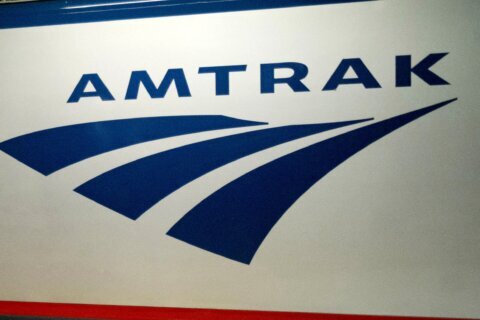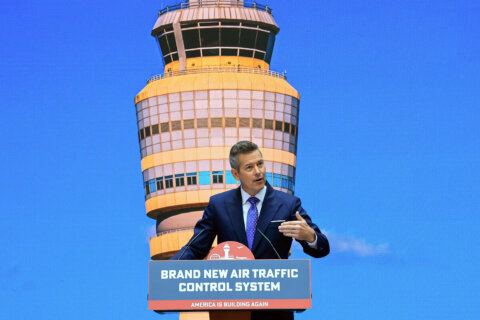WASHINGTON — Metro riders, business owners and others will have one chance to let their voices be heard about plans to dramatically scale back service.
Metro’s board will hold a 9.5-hour public hearing later this month on the proposed service cuts plus a potential increase in bus service, which Metro is outlining in detail for the first time.
The lone public hearing will be held at Metro’s headquarters from 12:30 to 10 p.m. on Thurs., Oct. 20. There is no advance sign-up for the hearing, and Metro will not guarantee that all who show up will be able to speak.
However, Metro will also accept comments by email and through a series of outreach events at stations beginning on Friday.
Service changes are expected to be finalized in December and would take effect by July 2017.
General Manager Paul Wiedefeld has said that Metro needs eight more hours per week to perform overdue maintenance on the aging rail system. The service cuts are intended to create that extra time. However opponents of the cuts argue that Metro should use available maintenance time more efficiently or target closures to sections undergoing maintenance.
A Federal Transit Administration inspector in May, for example, was with nearly 100 workers who stood around for more than two hours for what was supposed to be a five-hour work zone.
“WMATA wastes tremendous resources when dozens of work crew (sic) are standing by to gain access to track when communications are not working between the (Rail Operations Control Center) and field personnel,” the inspector wrote in one of hundreds of inspection reports released Friday.
Wiedefeld acknowledged recently that Metro must be more efficient. But he argued that the system is much larger than it was two decades ago and requires more time for inspections and maintenance.
Federal investigations have found that for years Metro prioritized keeping trains running over maintaining the system.
Metro is also offering an online survey as another option for riders to provide feedback on the four proposals. However the survey results will not be part of the official record of public comments on changes to the service schedule.
The survey asks the time of day they rode Metro in the last week, which of the four proposals they would “most prefer,” and how riders would make the trips Metro would no longer provide.
Bus service proposals
Documents tied to the public hearing indicate that Metro staff will present the board with information on replicating the rail system with extra bus service when the rail system is closed. A second option would extend service on some lines and make off-hours service more frequent on others.
The documents do not indicate how much either plan might cost.
The more limited bus service proposal would change some existing bus lines to offset cuts to rail service. For example:
- Extend the L2 route from Connecticut Avenue to Friendship Heights, Bethesda and White Flint
- Extend the 82 or 83 routes to connect downtown D.C. to College Park along Rhode Island Avenue
- Extend the 16E Columbia Pike route
- Extend the 13Y Pentagon-DC-Reagan National Airport route to downtown
Even with the extended service, Metro staff said the buses would only be a good substitute for about 32 percent of trips during late night hours and 31 percent of trips during weekend morning hours. Metro defines a “good substitute” as a trip with up to one transfer that takes no more than 1.5 times as long as a rail trip would.
Trips that could be made with two transfers or with even more significant travel time increases could accommodate an additional 40 percent or so of trips, although they would be undesirable for many riders.
Metro estimates 28 percent of rail trips made during late nights would have no good replacement under the more limited bus service expansion. And 32 percent of weekend morning trips would have no replacement Metro service.
The DC Circulator, which is operated separately from the Metrobus system, extended its hours this week to partly address the higher demand downtown now that Metro closes at midnight on weekends.
Wiedefeld acted on his own to shut the system at midnight on Fridays and Saturdays beginning in June and Metro also no longer opens late or early for special events like Nationals games or concerts.
The Metro board must approve any permanent schedule changes.
Public Outreach will be held at the following stations:
- Friday, Oct. 7 from 8 p.m. to midnight at Dupont Circle, Farragut North, Foggy Bottom, Metro Center
- Saturday, Oct. 8 from 7 to 11 a.m. at Fort Totten, Shady Grove, Silver Spring, West Hyattsville
- Saturday, Oct. 8 from 8 p.m. to midnight at Clarendon, Columbia Heights, Gallery Place, U Street
- Sunday, Oct. 9 from 7 a.m. to noon at Anacostia, Columbia Heights, Metro Center, Southern Avenue
- Sunday, Oct. 9 from 8 p.m. to midnight at Dupont Circle, Foggy Bottom, Silver Spring, Union Station
- Friday, Oct. 14 from 8 p.m. to midnight at Fort Totten, Gallery Place, U Street, Union Station
- Saturday, Oct. 15 from 7 to 11 a.m. at Anacostia, Columbia Heights, Crystal City, Southern Avenue
- Saturday, Oct. 15 from 8 p.m. to midnight at Dupont Circle, Foggy Bottom, Metro Center, Silver Spring
- Sunday, Oct. 16 from 7 a.m. to noon at Fort Totten, Pentagon City, Rosslyn, Silver Spring
- Sunday, Oct. 16 from 8 p.m. to midnight at Columbia Heights, Gallery Place, Metro Center, National Airport
Four proposed new service schedules:
| Hours before June 2016 | Proposal 1 | Proposal 2 | Proposal 3 | Proposal 4 | |
|---|---|---|---|---|---|
| Mon-Thu | 5 a.m. — midnight | 5 a.m. — midnight | 5 a.m. — 11:30 p.m. | 5 a.m. — 11:30 p.m. | 5 a.m. — midnight |
| Fri | 5 a.m. — 3 a.m. | 5 a.m. — midnight | 5 a.m. — midnight | 5 a.m. — 1 a.m. | 5 a.m. — 3 a.m. |
| Sat | 7 a.m. — 3 a.m. | 7 a.m. — midnight | 7 a.m. — midnight | 7 a.m. — 1 a.m. | 9 a.m. — 3 a.m. |
| Sun | 7 a.m. — midnight | 7 a.m. — 10 p.m. | 7 a.m. — 11:30 p.m. | 8 a.m. — 11 p.m. | noon-11 p.m. |







